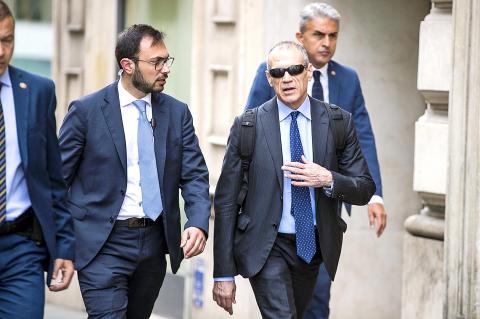The euro hit a six-an-a-half-month low yesterday, falling for a third day in row as a selloff in Italy’s bond markets due to rising political worries drove investors to dump the single currency.
Italian President Sergio Mattarella on Monday set the nation on a path to early elections, appointing former IMF official Carlo Cottarelli as prime minister with the task of planning for snap polls and passing the next budget.
Financial markets are concerned the elections, which could take place as soon as August, might serve as a quasi-referendum on Italy’s role in the EU and eurozone, and strengthen the nation’s euroskeptic parties even further.

Photo: EPA
The euro yesterday dropped below US$1.16 for the first time in six-and-a-half months, down 0.3 percent on the day.
Against the Swiss franc, it fell by a similar margin to 1.1528 francs.
“The spillover effect on the euro from the Italian bond markets is limited for now, but that can change if the selloff forces investors to dump other peripheral debt,” said Viraj Patel, a currency strategist at ING in London.
On a monthly basis, the euro has fallen more than 4 percent and is set for its biggest monthly drop in more than three years, according to Thomson Reuters data.
Italy’s two-year bond yield was up 54 basis points at 1.42 percent, having earlier touched 1.7 percent — its highest since late 2013.
“There are still a lot of euro long positions that had been built up during the currency’s bull phase until May that need to be unwound, and the euro’s decline looks set to continue,” said Yukio Ishizaki, senior currency strategist at Daiwa Securities in Tokyo.
With a decline in US Treasury yields also weighing, the greenback lost about 0.6 percent to a three-week low of ¥108.730.
The US dollar rose briefly to ¥109.830 on Monday as US-North Korea summit plans appeared back on track, but the relief has been quickly eclipsed by eurozone political concerns.
The US dollar index against a basket of six major currencies was up 0.5 percent on the day at 94.70, hitting a six-and-a-half month high.
The Australian dollar, sensitive to shifts in risk sentiment, was down 0.3 percent at A$0.7525. The New Zealand dollar slipped 0.2 percent to NZ$0.6929.

SEEKING CLARITY: Washington should not adopt measures that create uncertainties for ‘existing semiconductor investments,’ TSMC said referring to its US$165 billion in the US Taiwan Semiconductor Manufacturing Co (TSMC, 台積電) told the US that any future tariffs on Taiwanese semiconductors could reduce demand for chips and derail its pledge to increase its investment in Arizona. “New import restrictions could jeopardize current US leadership in the competitive technology industry and create uncertainties for many committed semiconductor capital projects in the US, including TSMC Arizona’s significant investment plan in Phoenix,” the chipmaker wrote in a letter to the US Department of Commerce. TSMC issued the warning in response to a solicitation for comments by the department on a possible tariff on semiconductor imports by US President Donald Trump’s

‘FAILED EXPORT CONTROLS’: Jensen Huang said that Washington should maximize the speed of AI diffusion, because not doing so would give competitors an advantage Nvidia Corp cofounder and chief executive officer Jensen Huang (黃仁勳) yesterday criticized the US government’s restrictions on exports of artificial intelligence (AI) chips to China, saying that the policy was a failure and would only spur China to accelerate AI development. The export controls gave China the spirit, motivation and government support to accelerate AI development, Huang told reporters at the Computex trade show in Taipei. The competition in China is already intense, given its strong software capabilities, extensive technology ecosystems and work efficiency, he said. “All in all, the export controls were a failure. The facts would suggest it,” he said. “The US

The government has launched a three-pronged strategy to attract local and international talent, aiming to position Taiwan as a new global hub following Nvidia Corp’s announcement that it has chosen Taipei as the site of its Taiwan headquarters. Nvidia cofounder and CEO Jensen Huang (黃仁勳) on Monday last week announced during his keynote speech at the Computex trade show in Taipei that the Nvidia Constellation, the company’s planned Taiwan headquarters, would be located in the Beitou-Shilin Technology Park (北投士林科技園區) in Taipei. Huang’s decision to establish a base in Taiwan is “primarily due to Taiwan’s talent pool and its strength in the semiconductor

French President Emmanuel Macron has expressed gratitude to Hon Hai Precision Industry Co (鴻海精密) for its plan to invest approximately 250 million euros (US$278 million) in a joint venture in France focused on the semiconductor and space industries. On his official X account on Tuesday, Macron thanked Hon Hai, also known globally as Foxconn Technology Group (富士康科技集團), for its investment projects announced at Choose France, a flagship economic summit held on Monday to attract foreign investment. In the post, Macron included a GIF displaying the national flag of the Republic of China (Taiwan), as he did for other foreign investors, including China-based